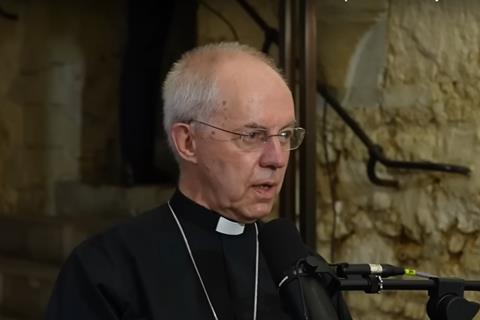Why has the Archbishop of Canterbury changed his mind on gay sex? Peter Lynas believes it’s because the Archbishop has adopted a view of morality which is based more on personal preference than objective standards

In a recent podcast interview Justin Welby appeared to deny the long held Anglican doctrine of marriage, not to mention the Church’s Living in Love and Faith (LLF) process.
Meanwhile on an entirely different podcast, John Mark Comer inadvertently exposed the fundamental problem with Welby’s comments. I listened to both recently and was struck by the contrast.
The Archbishop joined Alastair Campbell and Rory Stewart on ‘Leading’, a spin off from their popular ‘The rest is politics’ podcast. Much of the interview was a helpful modelling of Christian engagement in the public square. Justin Welby has a good relationship with pro-faith atheist Campbell and church-going Stewart, and he shared openly about his family past and his own struggles with mental health. He was a little sketchy on theodicy, suffering and revelation but then came the question about “gay sex”.
Everyone knew this moment was coming, not least because Campbell had asked Welby about it previously in a 2016 GQ interview. Campbell wondered if the Archbishop had a better answer now. Welby thought he did.
Sadly, he was wrong.
The Archbishop answered, “Where we’ve come to, is to say that all sexual activity should be within a committed relationship whether it’s straight or gay.”
And with that he ‘sold the farm’.
The issue isn’t that the Archbishop has abandoned the teachings of the Church of England (that all sexual activity should be within a marriage between one man and one woman) - though he has. The real concern is how he got there.
Welby actually doesn’t explain his own thinking in any detail, even in his follow up statement, which was released in the aftermath of the interview and the controversy it generated.
The statement said his thinking has “evolved” (does that mean the rest of us haven’t?). He “now holds this view sincerely” (was it not sincere before?) And finally it reflects, “his commitment to welcome, love and include LGBTQ+ people” (again suggesting others aren’t so committed).
Then up pops John Mark Comer on my feed, in a clip from ‘The Art of Teaching’ where he and Jon Tyson discuss preaching in the current culture. Both have led churches in progressive cities but both hold to a biblical sexual ethic - and believe it is essential to speak clearly about it. In the clip, Comer notes that human beings can’t live without meaning, can’t live without purpose and can’t live without authority. That authority used to be vested in God and scripture but in our secular culture it has to go somewhere else. Having cast off the transcendent and any authority outside of ourselves, we are forced to turn inward. External authority is seen as oppressive and a problem. Instead, the solution is found by internalising authority - we must simply be authentic to the self.
he seems to think personal truth trumps biblical truth - we know church doctrine says ‘x’, but I and a number of other bishops sincerely feel ‘y’ is better
As Comer notes, this leads to morality by feeling. He references Carl Trueman who suggests that most people do ethics the way they do fashion or home design - it is based on aesthetic opinion. Morality is based on personal preference rather than objective standards - if it feels good, do it.
Comer wasn’t responding to anything Justin Welby said - his comment just happened to be released on a podcast at the same time. But, the contrast couldn’t be clearer.
Welby seems to have accepted the secular story and as a consequence limited the authority the Bible has over our lives. He seems to have accepted the story of individualism in which the self is the final arbiter - if it feels good, do it. Finally, he seems to have accepted the postmodern perspective where personal truth trumps biblical truth - we know church doctrine says ‘x’, but I and a number of other bishops sincerely feel ‘y’ is better. This requires almost Trumpian levels of post-truth posturing in an attempt to gaslight those who hold to biblical orthodoxy.
I have made a slightly longer video contrasting Justin Welby’s comments on sexuality with John Mark Comer - it goes to the heart of the issue and why Welby’s comments signify a much deeper problem. It’s a 2 parter pic.twitter.com/SDOX6DxSZN
— Peter Lynas (@peterlynas) October 26, 2024
I wrote earlier that Welby has “sold the farm” - to try to capture the scale of the underlying shift required to say what he said. But, it’s also worth remembering that he hasn’t actually sold the farm because he can’t - it’s not his to sell. Hebrews reminds us that God’s kingdom is unshakeable. Archbishops come and archbishops go, but God remains on the throne.
Some, like Richard Dawkins, seem to want the kingdom without the king - cultural Christianity without a life submitted to Jesus. Others, like Justin Welby seem to want the king without the kingdom - Jesus, without the truth of the Bible that reveals him to us. Neither works.
Marriage between one man and one women is woven into the pages of scripture from Genesis to Revelation. The marriage metaphor beautifully describes Christ and the church. Thankfully, regardless of what any of us think, say or do - the king and his kingdom are coming. Jesus will return to be united with his bride - and no-one is going to redefine that - regardless of how sincere their belief.






































11 Readers' comments